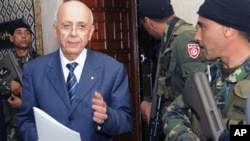The U.S. State Department said Tuesday it thinks Tunisia’s new unity government is making progress toward political reform despite continuing disputes over its make-up. U.S. officials believe the events of the past week in Tunisia, in which authoritarian President Zine el-Abidine Ben Ali was driven from power, have implications for the region.
The State Department is downplaying the continuing turmoil in Tunisia’s interim administration, and says it believes the country’s politicians are making progress toward a credible electoral process.
Four ministers, three of them from the country’s trade union movement, resigned Tuesday, only a day after being appointed, complaining that the transitional government includes too many holdovers from the ousted Ben Ali government.
The new leadership has promised parliamentary and presidential elections within six months through no dates have been set.
Briefing reporters, State Department Spokesman P.J. Crowley said the United States is closely monitoring developments and believes the interim government is moving in the right direction despite what he described as political "jockeying."
|
Zine El Abidine Ben Ali |
"I think the interim government in Tunisia is moving ahead," he said. "They have taken some steps to begin the process of reform. They’re opening up space for the media to actually report on what’s going on. They have brought some opposition leaders into the government. Obviously there’s a debate going on as to whether more needs to be done. There is a process underway inside Tunisia and we will be looking to see if there are ways in which we can provide support."
Public protests drove President Ben Ali from power Friday, only a day after U.S. Secretary of State Hillary Clinton, at a political forum in Qatar, said that many Arab governments risked “sinking into the sand” unless they liberalized their political systems and economies.
In his comments here, spokesman Crowley sidestepped a question as to whether the United States is worried about a chain reaction of friendly Arab leaders being deposed. But he said governments in the region need to be responsive to public needs and concerns.
"There is this pent-up desire for reform in the region," he said. "It is important for governments to listen to their people, and it important for governments to respond to their people. We want to see political reform occur. Governments are hard-pressed, obviously, to create political, social and economic opportunity for their people. We are a partner in this process, but clearly it is important for governments to listen to their people and to take affirmative steps to meet the aspirations of their people."
Crowley said the situation on the ground in Tunisia has improved somewhat in the last two days, but that the United States Tuesday conducted an evacuation flight from Tunis to Rabat of 70 U.S. diplomatic dependents and private citizens.
The action was in keeping with a travel alert for Tunisia issued by the State Department Sunday, which advised U.S. citizens to defer non-essential travel to the North African country, and announced an "authorized departure" of family members of U.S. diplomats.




